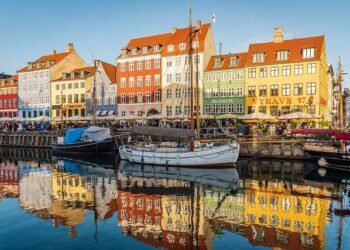In a significant move toward greener skies, France has joined forces with Germany, Spain, Sweden, Denmark, the Netherlands, and several other European nations to spearhead a continent-wide sustainable aviation initiative. This collaborative effort aims to revolutionize air travel by embracing innovative technologies and eco-friendly practices, with the dual goals of boosting tourism and drastically reducing environmental impact. As Europe accelerates its commitment to sustainability in the travel sector, here’s everything you need to know about this landmark drive shaping the future of aviation and tourism.
France Accelerates Sustainable Aviation Initiatives to Enhance Eco-Friendly Tourism Across Europe
France is ramping up its commitment to sustainable aviation by introducing a series of groundbreaking measures aimed at minimizing the carbon footprint of air travel while promoting eco-friendly tourism throughout Europe. These initiatives include the expansion of biofuel usage in commercial flights, investments in electric and hybrid aircraft technology, and partnerships with leading aviation companies to pilot innovative environmental solutions. In tandem with other European leaders such as Germany, Spain, and the Netherlands, France is positioning itself as a pivotal player in the continent’s green aviation movement, which seeks to balance tourism growth with ecological responsibility.
Key highlights of France’s sustainable aviation strategy:
- Subsidies for airlines adopting sustainable aviation fuels (SAFs)
- Development of carbon-neutral airport infrastructure
- Collaboration on cross-border emission reduction targets
- Incentives for passengers choosing eco-friendly flight options
- Promotion of research into electric and hydrogen propulsion systems
| Initiative | Objective | Timeline |
|---|---|---|
| Biofuel Expansion | 50% sustainable fuel usage by 2030 | 2024-2030 |
| Electric Aircraft Trials | Commercial flights on electric planes | Starting 2026 |
| Carbon-Neutral Airports | Reduce airport emissions by 70% | 2025-2035 |
Collaborative Efforts Among European Nations to Reduce Carbon Emissions in Air Travel
Leading European countries including France, Germany, Spain, Sweden, Denmark, and the Netherlands have ramped up their collaboration to slash carbon emissions in the aviation sector. This unprecedented alliance focuses on innovative technologies such as sustainable aviation fuels (SAFs), electrification of short-haul flights, and optimized air traffic management. Governments and industry stakeholders have pledged to accelerate investments in research and infrastructure, aiming to meet the European Union’s ambitious climate targets while supporting the resurgence of tourism. Key policy frameworks emphasize not only emission reductions but also fostering a competitive and eco-friendly aviation market.
The collaborative approach highlights several crucial initiatives designed to drive immediate impact:
- Joint Funding Pools: Creation of shared financial resources for green technology pilots and airport upgrades.
- Harmonized Regulations: Streamlining carbon pricing mechanisms across borders to avoid inefficiencies.
- Data Sharing Platforms: Enhancing transparency and coordination in emissions monitoring and reporting.
- Tourism Integration: Aligning sustainability goals with tourism growth strategies to ensure balanced economic and environmental outcomes.
| Country | Key Initiative | 2025 Emission Reduction Target | |||||||||||
|---|---|---|---|---|---|---|---|---|---|---|---|---|---|
| France | Deployment of SAFs in major hubs | -25% | |||||||||||
| Germany | Electrified regional flights | -30% | |||||||||||
| Spain | European Aviation Sector Collaborative Climate Initiative Overview:
Governments and industry stakeholders are committing to increased investments in research and infrastructure to align with the EU’s climate targets, while sustaining tourism growth. Key Collaborative Initiatives:
Country-Specific Targets for 2025: | Country | Key Initiative | 2025 Emission Reduction Target | If you provide the rest of the table or any additional data, I can complete the summary or help with further analysis. Key Strategies and Recommendations for Travelers Embracing Sustainable Aviation ChoicesAs sustainable aviation continues to gain momentum across Europe, travelers play a pivotal role in advancing eco-friendly air travel practices. Prioritizing airlines that invest heavily in electric and hybrid aircraft technology or those committed to sustainable aviation fuel (SAF) usage can significantly reduce your carbon footprint. Additionally, choosing direct flights over connecting routes minimizes fuel consumption and emissions. Before booking, it’s also wise to consider airlines’ transparency regarding their environmental policies, as many now publish annual sustainability reports showcasing their progress. Supporting carriers with strong environmental commitments not only encourages the industry to innovate but also creates a demand-driven push towards greener skies. To complement smarter flight choices, travelers are encouraged to adopt holistic sustainable travel habits. Packing light minimizes aircraft weight, linking directly to lower fuel use. Opting for airports with robust public transportation connections or car-sharing options further reduces environmental impact on the ground. The following table highlights key travel decisions and their environmental benefits, guiding eco-conscious flyers:
Future OutlookAs France aligns with Germany, Spain, Sweden, Denmark, the Netherlands, and other key European nations in advancing sustainable aviation, the continent takes a decisive step toward greener skies and more responsible tourism. This collaborative effort underscores a shared commitment to reducing environmental impact while revitalizing the travel industry. As these countries invest in innovative technologies and eco-friendly policies, travelers can anticipate a future where exploring Europe goes hand in hand with preserving its natural beauty. Stay tuned as this pivotal initiative unfolds, promising significant benefits for both the environment and the tourism sector across the region. ADVERTISEMENT |
















